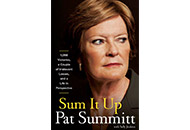Game On: Pat Summitt on the Fight of Her Life
This was a different kind of pain, however. And I didn't know how to deal with it. Neither did Tyler, who was then 20 years old and a junior at the University of Tennessee. Early one morning, he came in my room and woke me up. It took a moment for my eyes to adjust in the flat, dim light. But when I made out his face, I saw he was weeping. "You're all I've got," he said. He begged me to address the disease with him. I needed to accept it, and help him accept it, too.
I shot upright in bed. "I am right here for you, son," I said. "Let's take care of this right now." It suddenly hit me that in trying to cope with the disease in my own way—denial—I had actually left my son alone in dealing with it.
Tyler crawled onto the bed, and I put my arms around him. We held each other and had a long talk. The only way to deal with trouble of this magnitude was to face it—and to admit that I would need a lot of help.
It wasn't easy to reverse the role of caretaker. All my life, I had preached "taking ownership" to athletes. I insisted they commit to their talent and to themselves, not just by working at the things they were good at, but by admitting the things they weren't good at. It was a difficult, counterintuitive thing to teach—no one feels strong when she examines her own weakness. But in facing weakness, you learn how much there is in you, and you find real strength. Don't look away from the difficult things, I urged our athletes. "Take ownership!"
Possess it, live it, act on it.
It was time to take ownership of my disease. The question was, how? What was the best way to confront it? Was it better to retire and concentrate on fighting the Alzheimer's, or was that too much of a concession? In order to decide, I had to review everything I thought I was about.
I had to remember.
 Pat Summitt is the head coach emeritus of the Lady Vols at the University
of Tennessee, where, health permitting, she still attends practice, recruits
players, and advises students. Her memoir, Sum It Up (Crown Archetype),
written with Sally Jenkins, and from which this excerpt is adapted, came out
in March.
Pat Summitt is the head coach emeritus of the Lady Vols at the University
of Tennessee, where, health permitting, she still attends practice, recruits
players, and advises students. Her memoir, Sum It Up (Crown Archetype),
written with Sally Jenkins, and from which this excerpt is adapted, came out
in March.
Keep Reading



